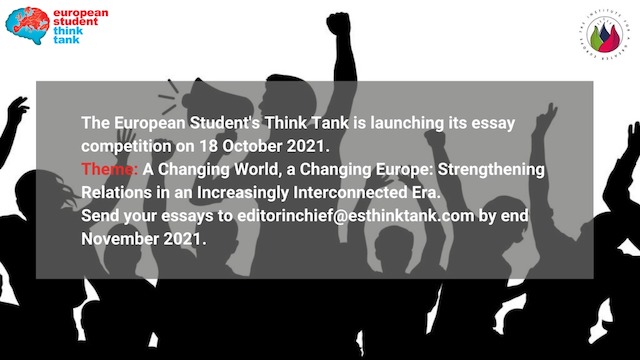
By Olga Papadopoulou, holder of a master’s degree in Migration, Ethnic Relations and Multiculturalism from Utrecht University and writer for the European Student Think Tank.
“No two human beings are alike;” goes a sentence in Haruki Murakami’s novel Hard-Boiled Wonderland and the End of the World, “it’s a question of identity” (1). Indeed, no two human beings are alike. Diversity exists in all aspects of our lives, which we cannot avoid and it is diversity that forces both authorities and citizens to struggle with the vital question of identity (2). One aspect of identity is religious identity. Religion has come to the forefront, in particular after the terrorist attacks of September 11, 2001 in the USA, the bombings during the Boston Marathon on April 15, 2013 and most recently the shootings of January 7th, 2015 in the office of Charlie Hebdo, a weekly satirical magazine in Paris, France. The two gunmen that shouted in Arabic “God is great”, were Said Kouachi and Cherif Kouachi, French Muslim brothers of Algerian descent. Consequently, the increasing conflicts between Muslims and non-Muslims all over the world have strengthened the religious identity of many groups, and may result in the rise of radicalisation or fundamentalism amongst them.
This paper focuses on religious identity and particularly Islamic identity in the European context. Specifically, it provides an overview of identity as a term and gives an extensive description of religious identity, the latter being fundamental to answer questions of who you are and what this means. The above-mentioned questions have a strategic position in current political and societal discussions, since the question of who you are can be interpreted in different ways and can affect a range of relationships and social structures.
Moreover, these questions receive additional attention, where people from different backgrounds live together and face the question what their background entails and how they should act towards members of their own group, as well as towards other groups. The consequences of this religious and ethnical diversity and the relevant choices made constitute a rich source for reflection and discussion in European societies. This is especially the case when people of different backgrounds “draw” boundaries, according to what is considered typical or “correct” of one’s own group. One case that highlighted the question of identity from the very beginning in Europe and became the subject of widespread discussion and the main reason of a civil war in 1990s was the dissolution of the Socialist Federal Republic of Yugoslavia (SFRY) firstly in its five countries along the original republics’ borders. The case of novelist and Nobel laureate Ivo Andrić constitutes a vivid representation of the situation in those times. Andrić was born in Bosnia to Croat parents, later living and working in Serbia and he wrote in both forms of Serbo-Croatian. However, he is claimed as part of Serbian, Croatian and Bosnian literature.
The Term of Identity
But what do we mean with the term identity? By definition, identity is a key factor for conceptualizing the relationship between individual and society or group. Identification is the relevant process of creating an identity and it establishes the link between the individual and a group. As soon as people identify with a group, that group becomes the basis for their thinking, feeling and acting. In other words, identification is a psychological process, in which individuals choose to belong to a certain group, depending on personal characteristics, common sentiments, preferences, needs, experiences or circumstances (2). Another common distinction is between “identification as” and “identification with” a group. Specifically, “identifying as” a member of a religious group does not necessarily imply that one identifies with that group. A person may recognize and accept a group as self-defining, but he or she does not have to consider this definition personally important or be emotionally involved. Self-categorization can exist without feelings of belonging or the group membership having emotional significance (2). “Identification with” refers to the degree to which the group is experienced as an integral and inseparable part of the self. For the group identifier, the distinction between “self” and “the group” is unclear; the fate of the group is experienced as the fate of the self (2).
Religious Identification
One form of identity is religious identification or religious beliefs in general. Religion is considered a major indicator of social distance and a superior “ethnic marker” (namely signs by which boundaries are defined, including religious symbols) (3). Consequently religion is important because it is a powerful identifier for the identity of individuals and groups.
When it comes to Islam, characteristics that highlight differences and the visible expression of the presence of Muslims are seen as being in conflict with integration into some host societies (e.g. the Islamic scarf controversy in France – pertaining to the wearing of a hijab in French public schools), but in others host societies is the opposite (e.g. Muslim women decided on April 30, 2009 to wear orange headscarves in order to celebrate Queen’s Day and to promote tolerance in the Netherlands).
In general, there are many reasons for individuals to perceive themselves as members of religious groups and various ways to explain the importance of (in-group) religious identification. According to Social Identity Theory (4), “identity is the part of an individual’s self-concept which derives from the knowledge of the group membership together with the value and emotional significance attached to that membership” (4, p.63). Religious identity is important, since it is one of the means of providing a sense of belonging, involvement, security, concern and pride. However, it is stated that people can feel (emotionally) closely connected to their in-group, while identification with and membership of that group brings them social contempt and discrimination or creates feelings of collective guilt. Religious identity for Muslims can serve as a tool for the achievement of positive identity or positive psychological group distinctiveness, through social comparisons between one’s own group and other groups, a distinction made via categorisation and comparison (4).
Secondly, many people identify with their religion, because it shapes a specific view of life and reality. Religion and religious groups can give a sense of stability, unity, inspiration and maintenance of group identity and solidarity to their members (5; 6). In addition, religion can dissolve the doubts one may have about oneself. This is crucial, especially for religious groups that have clear boundaries and distinctions. Furthermore, Salman Rushdie’s following sentence in his work Imaginary Homelands (7) reflects his thoughts about religion, “I’ve been finding my own way towards an intellectual understanding of religion”.
At this point, it is important to note that people do not identify with just one group, but with several groups and to different degrees and simultaneously. Thus, people have multiple identities and religious identities are always among other identities. On the subject of identity, Miss USA 2010 Rima Fakih, the first Arab-American and the first Muslim-American who won the Miss USA title on May 16, 2010, was quoted as saying “I’d like to say I am American first, and I am an Arab-American, I am Lebanese-American, and I am Muslim-American” (8). The same holds for the Netherlands and France; besides being a Muslim, an individual can be also a female, a mother and a Dutch or French of citizen.
Mobilization vs. Prejudice
Muslims’ identification with their religious group represents the precondition for mobilization among Muslims. Mobilization is the wish among Muslims to spread Islam (strengthening ones’ in-group by extending it). On the one hand, from the perspective of modernisation, it is assumed that with a longer stay in Western countries the importance of religion will diminish. On the other hand, one relevant and related phenomenon to staying in Western countries is prejudice, which involves stigmatization as well as more open hostility towards ethnic minorities in general and Islamic groups in particular. The Netherlands has extensive legislation to combat discrimination and racism. However, there has been growing concern about acts of violence targeting Muslims. Following the 11th of September 2001 and the assassination of Theo Van Gogh on 2004, there was an increase in the number of reported incidents, including vandalism and acts of aggression against Muslims and Islamic symbols. The most dramatic incident of anti-Muslim violence was the destruction by fire of a Muslim primary school in the city of Uden in December 2004, which led Dutch politicians to publicly speak out against the attacks against Muslims.
In sum, for many individuals religion remains a basic element for the formation of their personality and lives. In particular, the question of religious identity and its different types remains always essential.
This piece expresses the opinions of the author only and does not necessarily reflect the position of the European Student Think Tank.
We are still looking for great writers to contribute to the European Student Think Tank!
References
- Murakami, H. (1993). “Hard-Boiled Wonderland and the End of the World”. Vintage Press.
- Verkuyten, M. (2004). “The Social Psychology of Ethnic Identity.” London: Psychology Press.
- Bartels, E. (2000). “Dutch Islam: Young people, learning and integration.” Current Sociology, 48, pp. 59-73.
- Tajfel, H. (1981). “Human groups and social categories.” Cambridge: Cambridge University Press.
- Agadjanian, A. (2000). “Religious Pluralism and National Identity in Russia.” International Journal on Multicultural Societies (IJMS), 2, pp. 97-124.
- Verkuyten, M. (2007). “Religious group identification and inter-religious relations: A study among Turkish-Dutch Muslims.” Group Processes and Intergroup Relations, 10, pp. 341-57.
- Salman, R. (1992). “Imaginary Homelands: Essays and Criticism 1981–1991.” Granta Books.
- Duke, A. (2010). “Miss USA says ‘American’ is her preferred label”, This Just In (CNN), retrieved September 27, 2013. http://news.blogs.cnn.com/2010/05/21/miss-usa-says-american-is-her-preferred-label/

 The ’Ndrangheta’s Infiltration and Threat to European Institutions
The ’Ndrangheta’s Infiltration and Threat to European Institutions  From Paper to Practice: How Grassroots Norms Undermine Gender Rights in Pakistan
From Paper to Practice: How Grassroots Norms Undermine Gender Rights in Pakistan  Exploited Childhoods: The Role of Global Corporations in Perpetuating and Mitigating Child Labour
Exploited Childhoods: The Role of Global Corporations in Perpetuating and Mitigating Child Labour  Human Rights Challenges in Addressing SLAPPs in Media, NGOs and Journalism in the EU
Human Rights Challenges in Addressing SLAPPs in Media, NGOs and Journalism in the EU 